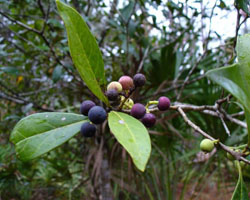Osmanthus americanus - Devilwood, Wild olive



Family Oleaceae
Description:
About fifteen species of Osmanthus are native to Asia and North America. Tea olive and sweet olive are Asian members of this genus that are commonly grown in gardens in the southern United States: Other members of the Oleaceae include olive, privet, jasmine, lilac, ash and forsythia. Devilwood is native to the southeastern United States. Its leaves are borne in pairs (opposite arrangement.) Branching tends to be open, never as dense as the closely related tea olive. The small, fragrant white flowers in spring are followed by half inch blue-black fruits that ripen in fall.
Location:
See this plant in dry natural areas of campus.
Size:
Small tree to about twenty feet tall in the garden. Old wild plants may reach fifty feet in height.
Care Instructions:
Light: full sun to part shade
Water: adaptable to moist to dry conditions
Soil: adaptable
This native tree is not readily available in nurseries but makes an attractive small, evergreen tree in the landscape. It is easy to grow in Jacksonville. It tolerates a wide variety of conditions but looks best in a moist, sunny to partly sunny site.
